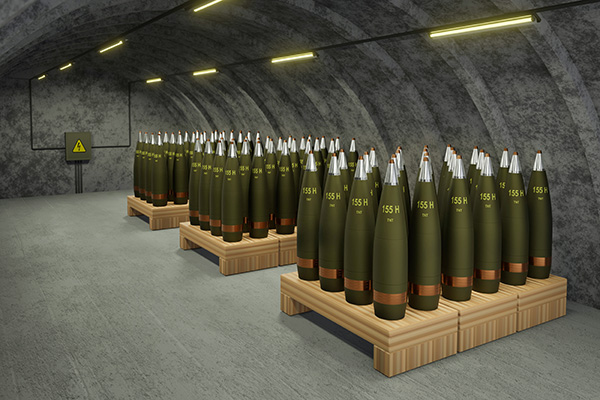The European Defence Agency (EDA) has been negotiating over the summer with the European defence industry to procure 155-mm ammunition for Ukraine, according to a statement by High Representative Josep Borrell at the informal foreign affairs council meeting last week.
Military aspects and Ukraine were at the centre of the first day of the council meeting. In his press remarks, he referred to the EU three-track ammunition initiative. The first track was about supplying Ukraine with shells from the existing stockpiles of the member states. This track ended in May and comprised 224,000 ammunition rounds and about 2,300 missiles.
The second track is a joint procurement process on behalf of the EU member states to replenish their stockpiles and to deliver more shells to Ukraine. This track has been delayed and was agreed on by the member states in beginning of May, ca 1,5 months after the three-track plan to supply ammunition to Ukraine was announced.
The intention is to deliver 1 million rounds of ammunition over 12 months. “Three framework contracts have already been signed,” HR Borrell announced. “Now it is to the member states to pass concrete orders inside these framework agreements with the industry. We did our work.”
EDA did not respond in time to a question from The Brussels Times about the contracts and the time-line. At today’s press conference (4 September), the Commission spokesperson said that the procurement process is not final and the number of framework contractors might increase. He declined to disclose the names of the contractors.
As regards track 3, the EU adopted in May a proposal for a new regulation to ramp up the EU’s capacity to produce ammunition in response to the war in Ukraine. This track is long-term endeavour, according to the High Representative. “Industry can only deliver if they have new orders, and they will not deliver if they do not have new orders, in order to increase its supply capacities.”
“We need to support Ukraine in a manner [that is] predictable and sustainable. Not just next month or next week but [with] the long-range lenses and showing to the aggressor that we are standing with Ukraine today, tomorrow and always. During the war and after the war.”
To that end, he proposed finding a sustainable and long-term way of supporting Ukraine, with a proposition of a ceiling of €20 billion - €5 billion per year – in the next 4 years. The discussion will continue in the Council and he hopes reaching an agreement by the end of the year.
The military equipment is financed by the European Peace Facility (EPF). A previous tranche of the Facility is currently blocked by Hungary and needs to be solved according to Borrell.
M. Apelblat
The Brussels Times

